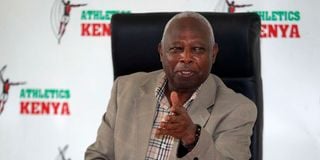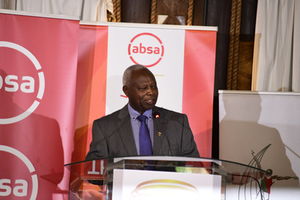
Athletics Kenya President Lt. Gen (retired) Jackson Tuwei speaks to the media during a past event at Riadha House.
Athletics Kenya (AK) is arguably the most vibrant sports federation in the country.
It takes pride in being the only federation besides Football Kenya Federation (FKF) to own its own offices.
Riadha House, the AK headquarters separated from Nyayo Stadium by Douglas Wakiihuri Road, has witnessed tranquillity for close to eight years until the landmark ruling by a Nairobi High Court Judge, Justice Lawrence Mugambi on March 7.
A High Court case challenging the new AK constitution and its review process, had sat on the corridors of justice for eight years until the ruling .
Unlike many federations that have witnessed skirmishes with their respective global bodies moving to ban or suspend the country from international competitions over government interference, like FKF, Badminton Kenya and Kenya Aquatics, all has been well in athletics.
Why has AK remained stable with programmes running smoothly despite the court case?
Mugambi ordered the current Athletics Kenya Executive to facilitate a further review of its constitution as per the Sports Act 2013 and pave the way for elections within 90 days.
Mugambi went ahead to bar Athletics Kenya President Jack Tuwei, his deputy Paul Mutwii and treasurer David Miano and the rest of the executive from contesting during the fresh elections, ruling they have served full terms.
Two-time Boston marathon champion Moses Tanui and nine others had gone to court to challenge the new constitution.
Interestingly, the Cabinet Secretary in the Ministry of Sports, Culture and the Arts, now the Ministry for Youth Affairs, Creative Economy and Sports were the second respondent in the case.
Tanui had sought to stop the implementation of the new Athletics Kenya constitution that had been ratified and adopted at the AK Annual General Meeting on April 27, 2016, terming it “illegal, null and void.”
One of the key issues Tanui wanted incorporated in the new constitution was the provision to allow athletes to vote during the AK elections.
Mugambi told Tuwei and his group to carry out further review of the AK constitution that was adopted and ratified on April 27, 2016 within the next 90 days of making of his order.
However, AK obtained stay orders pending an appeal that will be heard within six months.
Despite the court case, AK has been able to run its affairs soundly with the country achieving major milestones like hosting the 2017 World Athletics Under-18 Championships and 2021 World Athletics Under-20 Championships at the Moi International Sports Centre, Kasarani.
Kenya finished on top of the medals table at the under-20 event with 16 medals -- eight gold, one silver and seven bronze.
Kenya was the only African country picked to host a World Athletics Continental Gold Tour, a second tier global in 2020.
Tuwei, who took over the AK reins from late Isaiah Kiplagat back in 2016, was elected as one of the four World Athletics Presidents during the 54th World Athletics Congress on August 17, last year in Budapest, Hungary.
Tuwei, who is serving as the Confederation of Africa Athletics senior vice president, became the third African to hold a senior position at World Athletics after former World Athletics president Lamine Diack of Senegal and former vice president Hamad Kalkaba Malboum of Cameroun.
“What has really worked for us is that we haven’t allowed politics to interfere with our development systems from grassroots level to the national level,” said Barnaba Korir, AK director for youth and development.
Korir said it was unfortunate that the case had dragged on at the High Court and there was little they could do but wait for it to be determined.
“We are so grateful to our affiliates from sub county, county, regional and national level for their support that has enabled us to pull through,” said Korir, adding that Tuwei’s leadership has been athletics’ foundation.
“We have focused on delivery and that is why we have been able to stay away from wrangles that have affected other federations to the extent of being banned or suspended,” said Korir.
Senior vice president Paul Mutwii reckoned that a good leadership is where programmes run amidst constructive criticism and politics.
“We are all political but that shouldn’t come between us and our delivery to the athletes, which we have,” said Mutwii, who is also the director of competitions at the athletics body.
"We hope the court case will be resolved soon for us to go to elections. No one wants to stay in office forever," said Mutwii.
However, AK has over the years grappled with the rising cases of doping
Twice since 2016, former President Uhuru Kenyatta and President William Ruto have saved the country from being banned over the doping scourge.
Kenyatta signed into law the 2016 Anti-Doping Act, which saw the establishment of the Anti-Doping Agency of Kenya (ADAK), a move that saved Kenya from yet another ban that could have seen the country miss the 2016 Rio Olympics.
In November 2022, President Ruto pledged Sh650m annually for a period of five years in the fight against doping, which saw the country escape an imminent ban.
Perhaps the biggest administrative fight at AK happened in November 2015 when business came to a standstill at Riadha House, when defunct Professional Athletes Association of Kenya (PAAK) members stormed the premises.
Led by then PAAK organising secretary Julius Ndegwa, the athletes demanded for the resignation of AK top officials, the late Isaiah Kiplagat and David Okeyo for their alleged involvement in corruption.
They also wanted an overhaul of the AK constitution to allow for active and retired athletes' to have a voice in the executive.
They called on World Athletics, then International Association of Athletics Federations (IAAF) Ethics Commission, to hasten its investigations and take appropriate action against Kiplagat, AK secretary-general Okeyo and former AK treasurer Joseph Kinyua, who have been implicated in a Nike sponsorship fraud.
They were accused of embezzling Sh70 million.
The trio had been interrogated by the Directorate of Criminal Investigations early in 2015. They were subsequently suspended by World Athletics.
The World Athletics Ethics Board found Okeyo guilty and banned him for life from athletics activities in 2018. He was also fined Sh5 million.
The case against Kiplagat, who passed away on August 24, 2016, was terminated but Kinyua was found to have "engaged in similar conduct".
Kinyua avoided any punishment as his position with the organisation was not bound by ethics rules at the time of the offence.
World Athletics passed their decision to AK to deal with. Kinyua quietly left the association.
All had not been well at AK after the 2013 World Athletics Championships in Moscow where 14 out of 16 regions under Southern Region chairman Paul Mutwii met to demand for a Special General Meeting.
The meeting was sought to discuss the new AK constitution whose draft, they claim, had been doctored and irregular appointments at Riadha House.
Mutwii's team almost succeeded in toppling Kiplagat from office but a court injunction put a stop to that.
What will the court decide this time?









